#joan copjec
Text
When you encounter the gaze of the Other, you meet not a seeing eye but a blind one. The gaze is not clear or penetrating, not filled with knowledge or recognition; it is clouded over and turned back on itself, absorbed in its own enjoyment. The horrible truth … is that the gaze does not see you. … You are on your own; the gaze of the Other is not confirming, it will not validate you.
—Joan Copjec
#words#copjec#Read My Desire#lacan#psychoanalysis#lacanian psychoanalysis#the other#the gaze#otherness#recognition#validation#joan copjec#philosophy#theory#theoryblr
361 notes
·
View notes
Text

Joan Copjec, Read My Desire
7 notes
·
View notes
Text
the terrible L queer studies has taken in accepting judith butler's formulation of gender. so sad. get joan copjec-ed. like a boss 😎
8 notes
·
View notes
Text

Joan Copjec tying together Freud, Lacan, Walter Benjamin, and Fritz Lang via desire in capitalism. From "Lacan꞉ The Silent Partners"
3 notes
·
View notes
Text
“The affect of shame, which is searing, painful, is not — according to psychoanalysis — a feeling of being negatively judged by another but of being intimately attached to something you do not understand and which thus feels alien to you.” - Joan Copjec, The Inheritance of Potentiality: an Interview
5 notes
·
View notes
Text
Slavoj Žižek – Cinsellik ve Başarısız Mutlak (2023)
Slavoj Žižek, felsefi sisteminin bugüne kadarki en titiz çalışmasında, diyalektik materyalizmin yeni bir tanımını sunuyor.
Bu kitabında, Alain Badiou, Robert Brandom, Joan Copjec, Quentin Meillassoux ve Julia Kristeva gibi isimlerin eserlerini yorumlamakla sınırlı kalmıyor; popüler bilimden kuantum mekaniğine, cinsel farktan analitik felsefeye uzanan bir macera vadediyor.
Žižek Möbius şeridini,…

View On WordPress
0 notes
Photo
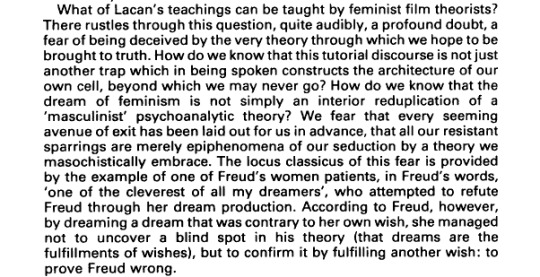
Joan Copjec reminding me of Fanny Howe’s writing on Virginia Woolf in “Doubt”:
“Virginia Woolf committed suicide in 1941 when the German bombing campaign against England was at its peak and when she was reading Freud whom she had staved off until then.“
“Virginia Woolf, a maestro of lyric resistance, was frightened by Freud’s claustrophobic determinism since she had no ground of defense against it. The hideous vocabulary of mental science crushed her dazzling star-thoughts into powder and brought her latent despair into the open air.
Born into a family devoted to skepticism and experiment, she had made a superhuman effort at creating a prose-world where doubt was a mesmerizing and glorious force.“
ugh
0 notes
Photo

joan copjec, from “the sexual compact”
204 notes
·
View notes
Text
While some blasé souls argue that we are already beyond psychoanalysis, the truth is that we have not yet caught up with its most revolutionary insights.
Joan Copjec
9 notes
·
View notes
Text
When you encounter the gaze of the Other, you meet not a seeing eye but a blind one. The gaze is not clear or penetrating, not filled with knowledge of recognition; it is clouded over and turned back on itself, absorbed in its own enjoyment. The horrible truth … is that the gaze does not see you. So, if you are looking for confirmation of the truth of your being or the clarity of your vision, you are on your own; the gaze of the Other is not confirming, it will not validate you.
Joan Copjec
5 notes
·
View notes
Quote
If it is tempting to read Foucault’s The History of Sexuality alongside Freud’s “On the History of the Psychoanalytic Movement,” it is because the former is well-situated historically to lift some of Freud’s burden by detailing the way the too rapid dispersion of psychoanalysis acquired its wings from a sanitizing betrayal and distortion of its concepts. The problem, however—as everyone knows—is that Foucault had no intention of tracking this betrayal but set out, instead, to confound Freud’s concepts with their aseptic reception. He had no interest in pointing out—quite the contrary—that if Victorian society was not reticent about sex, but talked about it endlessly, this did not mean that this society adopted Freud’s pansexualism. Sex did not in this moment suddenly emerge as ubiquitous—or, again, as promiscuous—in psychoanalysis’s profound sense of being irreducible to any stable point or position within the symbolic. On the contrary, all the endless discoursing about sex during the Victorian period was pressed into the service of making it over into the ideal point of the subject’s cohesion, the elusive and alluring core of her identity. That this was a terrible distortion of Freud’s notion of sex does not dawn on Foucault, who launches into a critique of Freud’s “repressive hypothesis” on the grounds that it sets up an invitation to transgressions that eventuates in the propping up of the very law they purport to transgress and tether subjects to the endless searching and safeguarding of their identities. Here is the obvious flaw in Foucault’s argument: it reduces Freud’s theory of sexuality—and, indeed, Freud’s theory simply—to the monarchy of a single “no,” prohibition. Not only does this leave entirely unexamined the variety of negations invoked by psychoanalysis—its multiplication of Verwords: not only Verdrängung (repression), but also Verneinung (another term for repression), Verleugnung (disavowal), Verwerfung (foreclosure), and Versagung (refusal), to name the most notable—it also loses sight of the profound dimension of the unconscious. Freud knew well that prohibition is temptation and never confused it with the barrier that separated the unconscious from consciousness.
Joan Copjec “No: Foucault,” After the Speculative Turn: Realism, Philosophy and Feminism, ed. Katerina Kolozova and Benjamin Woodard (New York: Punctum Books, 2016), p. 74f.
4 notes
·
View notes
Photo
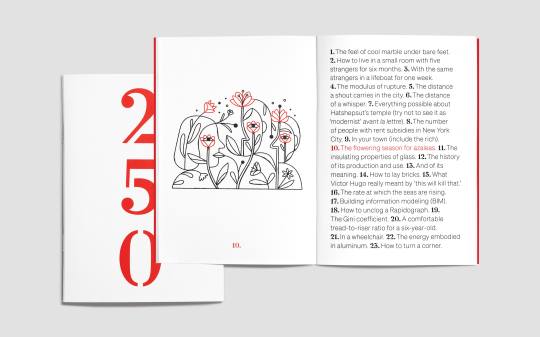

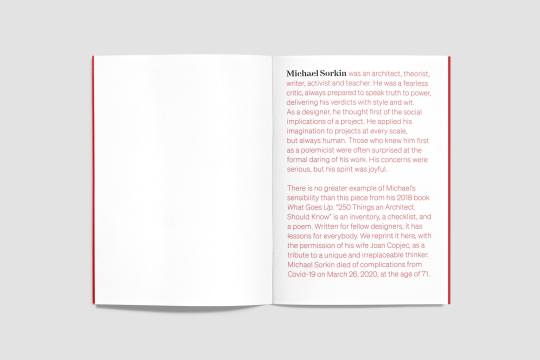

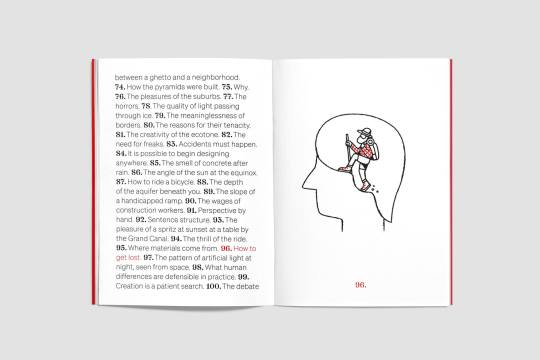

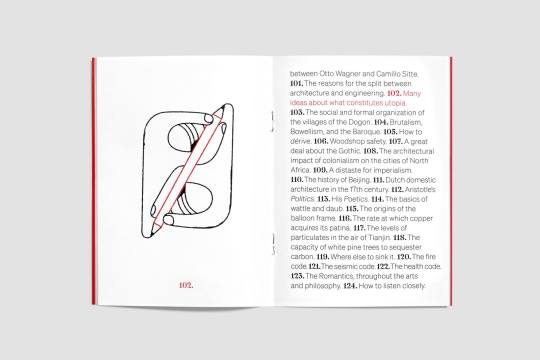

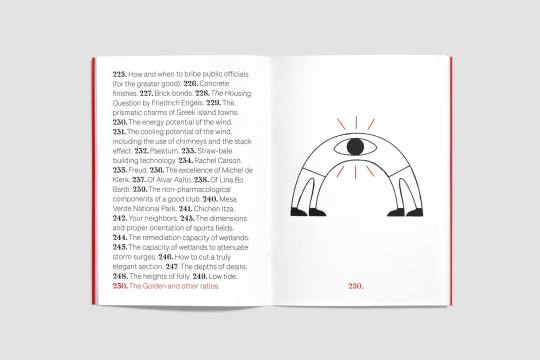
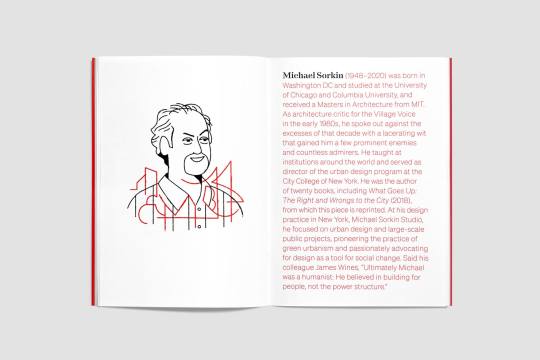
(via ‘Two Hundred Fifty Things an Architect Should Know’)
Every holiday season since 1971, Pentagram has designed and published an annual greeting for friends, colleagues and clients. Usually centered around a game or activity, the small books are intended to provide a diversion during the hectic holiday period. With much of the world on lockdown in 2020 due to the Covid-19 pandemic, a moment of reflection felt more appropriate.
The 2020 holiday card reprints “Two Hundred Fifty Things an Architect Should Know,” an essay by the celebrated architect, critic and educator Michael Sorkin. Taken from his 2018 book What Goes Up, the piece functions as an inventory, or checklist, of observations, tips and bits of advice. Written for fellow designers, it has lessons for everybody and offers a holistic philosophy for living that keeps the world in mind. The card is intended as a tribute to Sorkin, who died of complications of Covid-19 on March 26, 2020, at the age of 71, and is reprinted with the permission of his wife Joan Copjec.
In the list, Sorkin's wit, humor and insight are captured in straightforward suggestions like "How to design a corner" to more meditative proposals like "How to get lost," to lines that run together like a poem and consider the entire design process:
39. What the client wants.
40. What the client thinks it wants.
41. What the client needs.
42. What the client can afford.
43. What the planet can afford.
(See the full list online here.)
Several entries are illustrated with imaginative red-and-black line drawings by Chris DeLorenzo, who also created a portrait of Sorkin. Typography is set in Danmark (by A2-Type) and Söhne (by Klim Type Foundry).
A limited number of copies are available while supplies last. To receive one, simply provide proof of a donation of any size to Terreform, the non-profit center for urban research founded by Sorkin to advance the ideas that shaped his life’s work.
2 notes
·
View notes
Text
“Psychoanalysis is a wound to thought that must constantly be reinflicted.” - Joan Copjec
2 notes
·
View notes



